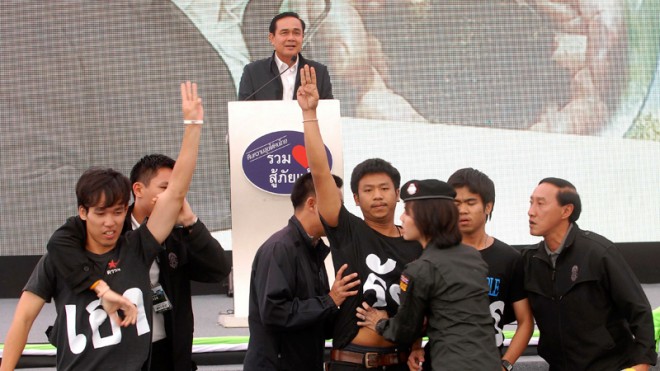Thai leader pats reporter on head, tugs his ear

In this Wednesday, Nov. 19, 2014 photo, Thai student activists raise the three-fingered salute in front of Thai Prime Minister Prayuth Chan-ocha speak in Khon Kaen province, northeast of Bangkok, Thailand. Five university students were arrested after giving the salute during the speech by Prime Minister Prayuth Chan-ocha, who led the coup as army commander. The military-imposed government banned the gesture, which symbolizes rebellion against totalitarian rule in the “Hunger Games” movie series. (AP Photo/Bangkok Post)
BANGKOK — Thailand’s military-installed prime minister, known for scolding journalists, is trying a new tack: patting their heads and tugging their ears.
A video posted on Facebook by Bangkok Post reporter Wassana Nanuam shows Prime Minister Prayuth Chan-ocha chatting Wednesday with reporters in the northeastern city of Khon Kaen. Some journalists kneeled in front of him to allow cameras a clear view.
Prayuth patted the baseball cap-clad head of a journalist directly in front of him, then nonchalantly tugged and twisted the man’s ear as he took questions.
Deputy government spokesman Sansern Kaewkamnerd said Thursday the gesture was good-natured teasing of reporters with whom he has become familiar.
“It came across as cute. He was smiling. They were also smiling,” he said. “It’s not weird for him to be playful with them.”
Article continues after this advertisementWassana’s Facebook comments suggested that while the reporters did not appear to take offense, some Thai people might be put off, since the head is traditionally considered a semi-sacred part of the body that strangers should not touch.
Article continues after this advertisementIt was the second glimpse that day of an apparently kinder, gentler Prayuth. Earlier, he smiled from a podium when five university students wearing T-shirts saying “Don’t Want a Coup” stood up and gave a three-fingered salute, a symbol of protest against the May 22 military takeover that Prayuth led as army commander.
“Anyone else wants to protest? Come quickly. Then I can continue with my speech,” Prayuth said as the audience chuckled.
Prayuth is generally uncomfortable with the media. In one case, two Thai newspaper reporters were summoned by the army for asking “inappropriate” questions about when and whether Prayuth would appoint a prime minister and organize elections. In another, he pounded a podium and lambasted a senior reporter who criticized his long-winded answers to questions.
Last week, public broadcaster Thai PBS replaced the host of a TV program after a visit by army officers who complained that the show’s content was provocative. The government, which can shut the station under martial law, insists the officers merely expressed their concerns.